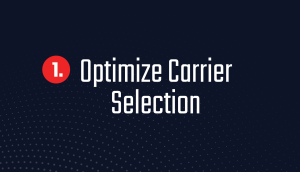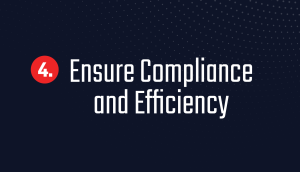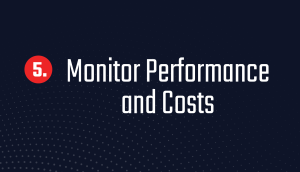Managing carrier relationships, performance, and logistics within the supply chain is a complex task—but with proper oversight, it doesn’t have to be. Effective carrier management extends beyond selecting carriers; it involves optimizing every aspect of operations to achieve maximum efficiency while minimizing disruptions.
In today’s competitive landscape, logistics is more than merely transporting goods from point A to point B; it requires strategic management to ensure timely deliveries that meet budget constraints and industry regulations. Whether businesses rely on third-party carriers or maintain fleets, strategically managing these carrier relationships can provide a significant competitive advantage.
For companies shipping large quantities of products, successful carrier management is essential. It ensures:
- Reduced transportation costs
- Improved delivery reliability
- Greater visibility across the supply chain
- Enhanced customer satisfaction
- Compliance with industry standards
- Trust-driven partnerships
Let’s dive into the five key aspects of effective carrier management and explore solutions that drive results.

1. Optimize Carrier Selection
Selecting the right carriers is essential for successful carrier management, significantly impacting cost efficiency and overall performance. Key criteria to consider include:
- Reliability: Does the carrier consistently pick up and deliver on time?
- Coverage: Can they meet your geographic distribution needs?
- Cost efficiency: Are their rates competitive within the industry?
- Safety: Does the carrier have a satisfactory rating?
Identifying the right carrier goes beyond basic selection; it’s about ensuring the carrier aligns with your business’s specific operational needs. This choice directly impacts your ability to meet delivery schedules, control transportation costs, and navigate industry regulations, all while maintaining seamless transportation operations. By evaluating factors like reliability, safety rating, geographic coverage, and cost-efficiency, businesses can ensure they’re partnering with carriers that support long-term goals and reduce operational risks.
Solution: Implement a carrier management tool to analyze performance data, such as on-time delivery rates, cost metrics, and geographic coverage. This enables informed, data-driven decisions and helps to select carriers that offer the best balance of reliability, cost, and service, ensuring optimized supply chain performance.

2. Build Strong Partnerships
Establishing a collaborative relationship with your carriers fosters long-term success. A strong partnership can lead to:
- Enhanced service during high-demand periods
- Faster resolution of disputes or issues
- Better negotiation of contract terms
Cultivating long-term, collaborative relationships with carriers is critical for maintaining smooth operations during both peak and regular demand cycles. Strong partnerships enable quicker issue resolution and flexible service agreements, minimizing disruptions. Businesses with robust relationships are better positioned to negotiate favorable terms and build trust that supports continuous improvement.
Solution: Schedule regular performance reviews and collaborative check-ins to align on expectations, identify areas for improvement, and resolve issues before they escalate. Leverage data from tools like a TMS to evaluate carrier performance and foster transparent relationships.

3. Increase Visibility with Technology
Real-time visibility into shipments helps you stay proactive rather than reactive. With better insight into the location of your goods, you can:
- Avoid delays
- Adjust shipping routes, if necessary
- Improve delivery times
Achieving visibility across your transportation network is essential for proactively managing shipments and avoiding costly delays. By knowing exactly where goods are at any given moment, businesses can respond swiftly to disruptions, optimize shipping routes, and improve delivery times. Real-time data helps transportation managers make quick, informed decisions that keep operations running smoothly.
Solution: Leverage advanced technology like real-time tracking systems and transportation management software (TMS) to provide full visibility into shipment progress. These platforms allow for route adjustments and enhanced communication with carriers.

4. Ensure Compliance and Efficiency
Compliance with regulatory standards is critical for avoiding delays and penalties. Proper adherence can also improve operational efficiency, as well-organized processes are less prone to errors or disruptions. Key areas to focus on include:
- Compliance with safety protocols and guidelines
- Accurate documentation and customs management
- Timely and precise billing
Compliance is crucial for the success of supply chain operations. Adhering to regulatory standards avoids costly penalties and facilitates smooth shipments. Key areas of focus include safety regulations, customs requirements, and billing accuracy, all of which help ensure that operations stay within legal and operational boundaries, thereby reducing risks and enhancing efficiency.
Solution: Automate compliance processes using tools such as customs management systems and safety monitoring platforms. These systems streamline documentation and monitor adherence to both local and international regulations, integrating safety checks that enhance operational efficiency and minimize legal risks. For instance, a customs management system can simplify paperwork, reducing delays and improving clearance times.

5. Monitor Performance and Costs
Focusing on carrier performance metrics—such as delivery times, cost per shipment, and claims—helps you:
- Identify underperforming carriers
- Highlight cost-saving opportunities
- Enhance operational decision-making
Monitoring carrier performance over time is crucial for maintaining high service standards. Regular evaluation of key metrics, such as delivery times and invoice accuracy, allows businesses to identify underperformance before it impacts operations. Using tools like carrier scorecards ensures consistent performance evaluation across your network, fostering reliability and operational efficiency.
Solution: Utilize data analytics to track performance metrics over time, allowing for consistent service evaluation. This enables timely adjustments and tracks cost-saving opportunities.
Carrier Management is Crucial for Supply Chain Success
As the logistics landscape continues to evolve, organizations that adopt these strategies will streamline operations, enhance customer satisfaction, and drive resilient growth.
For companies looking to elevate their carrier management practices, IntelliTrans offers advanced solutions that promote efficiency and transparency throughout the supply chain. With our Transportation Management Software and commitment to delivering shipper-oriented solutions, we’re well-positioned to support your journey toward optimized logistics and strategic partnerships.
Let’s explore how we can work together to achieve your supply chain goals with IntelliTrans.

